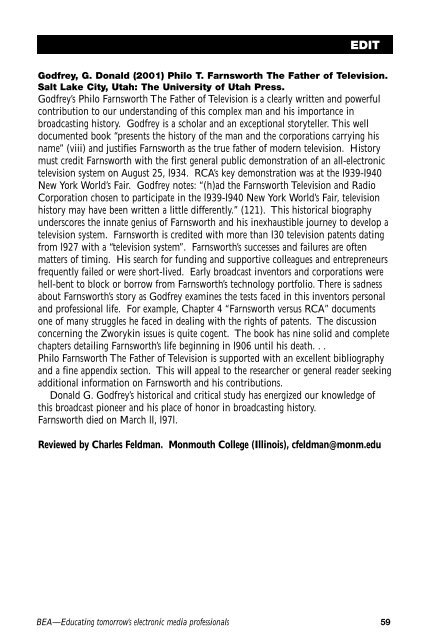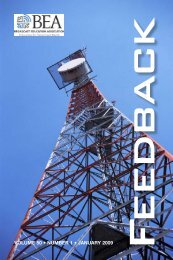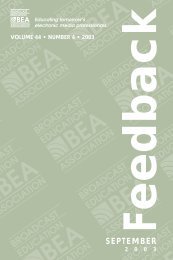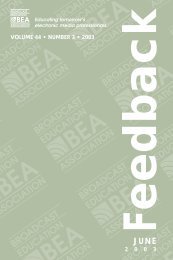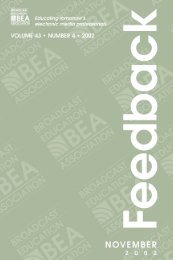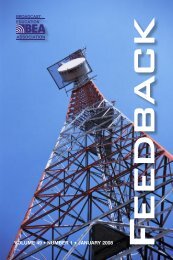EDITGodfrey, G. Donald (2001) Philo T. Farnsworth The Father of Television.Salt Lake City, Utah: The University of Utah Press.Godfrey’s Philo Farnsworth The Father of Television is a clearly written and powerfulcontribution to our understanding of this complex man and his importance inbroadcasting history. Godfrey is a scholar and an exceptional storyteller. This welldocumented book “presents the history of the man and the corporations carrying hisname” (viii) and justifies Farnsworth as the true father of modern television. Historymust credit Farnsworth with the first general public demonstration of an all-electronictelevision system on August 25, l934. RCA’s key demonstration was at the l939-l940New York World’s Fair. Godfrey notes: “(h)ad the Farnsworth Television and RadioCorporation chosen to participate in the l939-l940 New York World’s Fair, televisionhistory may have been written a little differently.” (121). This historical biographyunderscores the innate genius of Farnsworth and his inexhaustible journey to develop atelevision system. Farnsworth is credited with more than l30 television patents datingfrom l927 with a “television system”. Farnsworth’s successes and failures are oftenmatters of timing. His search for funding and supportive colleagues and entrepreneursfrequently failed or were short-lived. Early broadcast inventors and corporations werehell-bent to block or borrow from Farnsworth’s technology portfolio. There is sadnessabout Farnsworth’s story as Godfrey examines the tests faced in this inventors personaland professional life. For example, Chapter 4 “Farnsworth versus RCA” documentsone of many struggles he faced in dealing with the rights of patents. The discussionconcerning the Zworykin issues is quite cogent. The book has nine solid and completechapters detailing Farnsworth’s life beginning in l906 until his death. . .Philo Farnsworth The Father of Television is supported with an excellent bibliographyand a fine appendix section. This will appeal to the researcher or general reader seekingadditional information on Farnsworth and his contributions.Donald G. Godfrey’s historical and critical study has energized our knowledge ofthis broadcast pioneer and his place of honor in broadcasting history.Farnsworth died on March ll, l97l.Reviewed by Charles Feldman. Monmouth College (Illinois), cfeldman@monm.eduBEA—Educating tomorrow’s electronic media professionals 59
EDITGokhale, Anu. Introduction to Telecommuncations.Introduction to Telecommunications by Anu Gokhale is not, as the title may suggest,another introductory textbook for survey courses in broadcasting and electronic media.This is about communication technology, written by a technologist (Gokhale hasacademic degrees in physics and industrial technology). Specifically, this book is anoverview of current voice and data transmission systems, emerging technologies and, toa lesser extent, their business applications. Gokhales book is comprehensive andthorough, but it is also quite technical. That’s not to say the subject matter isirrelevant. Indeed, in an industry driven by technology, student exposure totechnological concepts is crucial. But the technical sophistication of this book probablyrelegates its use to courses in new technology, and perhaps telecommunicationsmanagement. It would also make a handy reference tool for telecommunicationsinstructors.Reviewed By Paul Gullifor, Bradley Univeristy, pfg@hilltop.bradley.eduBendetti, R. (<strong>2002</strong>). From Concept to Screen: An Overview of Film andTelevision Production. Boston, MA: Allyn and Bacon. Robert Bendetti is bestknown for his books on acting, particularly the standard text The Actor at Work, now inits eighth edition. In this volume, however, the author draws upon his film andtelevision background, which has won him numerous awards, including an Emmy anda Cable Ace Award. From Concept to Screen delivers, in compact form, what the titleindicates: an overview of the film and television production process from thedevelopment of a concept and financing the project, through pre-production,scriptwriting and casting, to postproduction editing and sound. The final chapter is alook at digital filmmaking. Sample scripts are included, as are numerous illustrationsand a glossary of production terms. Although it treats the topics somewhat briefly (154pages), the book contains a wealth of information that should be valuable to the novicefilmmaker. Its brevity will make this a welcome addition for introductory orintermediate-level classes for which the instructor wishes to provide a concise textbookat a reasonable cost.Submitted by: Laurence Etling, Valdosta State University, letling@valdosta.edu60<strong>Feedback</strong> <strong>May</strong> <strong>2002</strong> (<strong>Vol</strong>. <strong>43</strong>, <strong>No</strong>. 2)
- Page 1 and 2:
Feedback May 2002 (Vol. 43, No. 2)F
- Page 3 and 4:
EditReviews . . . . . . . . . . . .
- Page 5 and 6:
Examples of student projects:• Pl
- Page 7 and 8:
These teachers will also offer a nu
- Page 9 and 10:
The whole project forum will meet t
- Page 11 and 12: An e-mail from a recent graduate wh
- Page 13 and 14: or grip contributes to the overall
- Page 15 and 16: Because much of the satisfaction in
- Page 17 and 18: RECORDMANAGEMENT: AN MBTI CASE STUD
- Page 19 and 20: $500 savings on his car purchase. E
- Page 21 and 22: is the largest and most comprehensi
- Page 23 and 24: The PR major at Central Michigan Un
- Page 25 and 26: FAST FORWARDTHE CONVERGENCE CURRICU
- Page 27 and 28: how to shoot video for our newspape
- Page 29 and 30: it meant overseeing radio commercia
- Page 31 and 32: RECORDTHE PARTICIPATION OF WOMENIN
- Page 33 and 34: On the programming front, in early
- Page 35 and 36: Of these 553 participants, 438 (79.
- Page 37 and 38: Table 4: Percentage of female membe
- Page 39 and 40: Kennard, W.E. (1998, September 29).
- Page 41 and 42: RECORDSOLVING THE “PRODUCER PROBL
- Page 43 and 44: PAUSETHE LIFE CYCLE OF AN ADMINISTR
- Page 45 and 46: decision to return to full-time tea
- Page 47 and 48: SEARCHBEA Interest Division Chairs
- Page 49 and 50: SEARCH2002-2003 Leadership Listing
- Page 51 and 52: DISTRICT 7 — All two-year schools
- Page 53 and 54: SEARCHBEA 2002-2003 SCHOLARSHIP WIN
- Page 55 and 56: SEARCHBEA STUDENT NEWS AWARDSby Dan
- Page 57 and 58: Table 3Broadcast Education Associat
- Page 59 and 60: EDITMcLean, Donald F. (2000). Resto
- Page 61: EDITBeale, M. E., & Murray, M. D. (
- Page 65: EDITKeller, Teresa & Hawkins, Steph


